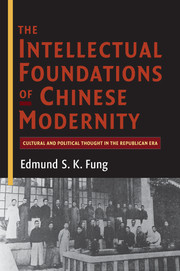 The Intellectual Foundations of Chinese Modernity
The Intellectual Foundations of Chinese Modernity Book contents
- Frontmatter
- Contents
- Acknowledgements
- Abbreviations
- A Note on Romanization
- Introduction
- 1 The Push of Westernized Radicalism
- 2 The Pull of Cultural Conservatism
- 3 The Politics of Modern Chinese Conservatism
- 4 Liberalism in China and Chinese Liberal Thought
- 5 The State, Government and the Rule of Law
- 6 The Rise of Reformist Socialist Thought
- 7 From State Socialism to Social Democracy
- Conclusion
- Glossary
- Selected Bibliography
- Index
- References
4 - Liberalism in China and Chinese Liberal Thought
Published online by Cambridge University Press: 03 May 2010
- Frontmatter
- Contents
- Acknowledgements
- Abbreviations
- A Note on Romanization
- Introduction
- 1 The Push of Westernized Radicalism
- 2 The Pull of Cultural Conservatism
- 3 The Politics of Modern Chinese Conservatism
- 4 Liberalism in China and Chinese Liberal Thought
- 5 The State, Government and the Rule of Law
- 6 The Rise of Reformist Socialist Thought
- 7 From State Socialism to Social Democracy
- Conclusion
- Glossary
- Selected Bibliography
- Index
- References
Summary
This chapter sets out to explore modern Chinese liberal thought on the premise that liberalism is the political doctrine of modernity. It is fitting to begin with a reference to Jerome Grieder's seminal work on Hu Shi in which the author draws a distinction between liberalism in China and Chinese liberalism:
Liberalism in China…meant much the same thing that liberalism has meant elsewhere: a belief in popularly based institutions of government, in the rule of law, in political processes that are made legitimate by the manner in which they function rather than by the ends ascribed to them; and, uniting all these elements, a belief in the creative and benign power of free intelligence. Liberalism in China remained, in the context of Chinese conditions, essentially an abstraction.
On the other hand, ‘Chinese liberalism meant something more concrete in the Chinese mind: a pattern of personal values reminiscent of the values of the Confucian “superior man,” an ideal that had existed virtually unchanged through the long centuries of imperial history.’ Grieder's point is that the Confucian tradition profoundly influenced Chinese liberal thought. The distinction he draws helps me to frame two questions for investigation in this chapter. First, how did Republican Chinese intellectuals understand liberalism? Second, what were the features and specific concerns of their liberal thought? In answering these questions, I will also attempt, at the end of the chapter, to shed light on the relationship of liberal thought to cultural radicalism and to conservative thought.
- Type
- Chapter
- Information
- The Intellectual Foundations of Chinese ModernityCultural and Political Thought in the Republican Era, pp. 128 - 158Publisher: Cambridge University PressPrint publication year: 2010


